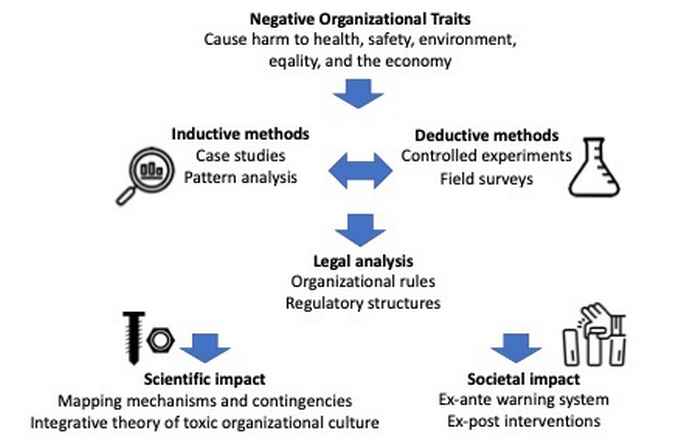About us
Organizational Ethics
Mission
Many of our biggest global challenges originate at least in part from unethical behavior and misconduct in organizations. Just consider the subprime loan sales by banks that caused the 2008 financial crisis, the sexual harassment as documented in the #MeToo scandals in public and private organizations that have forever scarred the lives of victims, and the continuing industrial pollution that destroys our natural resources, threatens public health, and contributes to climate change. After such incidents the conclusion is often similar: The organization (or sub-department) had developed a negative environment that came to sustain individual wrongdoing. Unfortunately, we still lack a scientific understanding of how organizations develop such negative environments and traits, and how this can be prevented from happening.
The main goal of the project is to develop an early warning system that allows regulators and regulated organizations to detect risks of negative organizational traits before these lead to harmful misconduct. As such, Organizational Ethics seeks to:
- Systematically understand what organizational traits are at play in cases where organizations structurally engage in damaging misconduct, and how such traits develop and shape structural damaging misconduct in different organizational settings and different points in time;
- Conduct case-studies, time-lagged field studies and experiments to analyze patterns of negative environments and traits in organizations, and develop a unique, interdisciplinary language and method of study to address unethical organizational traits;
- Jointly with regulators develop tailor-made methods to diagnose risks of unethical behaviour in other regulated organizations where there is no indication of (structural) damaging misconduct yet;
- Jointly with regulators from a broad range of domains co-develop processes and procedures in which such diagnostic methods can be applied effectively and fairly in the specific regulatory processes they operate and with the organizations they regulate.
Main projects
Mapping of existing knowledge about organizational traits and misconduct
With the literature searches, the research will first conceptualize what exactly should be studied to assess and diagnose organizational traits. Then it will collect insights from across the social and organizational sciences to identify indicators for any negative traits. Third, the team will collect and assess existing studies about ethical, unethical, and negative organizational cultures and climates.
Case studies
Following the literature review, the project will conduct case studies (using within-case analysis (process tracing) and across case comparison) of organizations that have structurally engaged in damaging misconduct, to assess what elements in their organization came to sustain and promote such misconduct. The selected and analyzed cases will be collected in a database to be made accessible and used by the general public.
Time-lagged field studies and controlled experiments
In experiments and time-lagged field studies, the directionality of relationships will be examined. Additionally, these methods provide opportunities to intervene in and shape social interactions by means of specific manipulations and validated training programs. The two sets of data will build on each other to offer an inductively grounded and deductive understanding of the social dynamics of how toxic culture develops and what is needed to prevent and curtail it.
Normative, legal, and regulatory analyses
Drawing on the case studies, field studies and experiments, the project will assess how the findings should be incorporated into organizational and regulatory rules, and related institutional arrangements.
Scope & Theoretic Background
Organizational Ethics seeks to make a major scientific breakthrough in developing a scientific agenda for how we think about and address organizational ethics. It seeks to develop a new social dynamic and pro-active approach to understanding and mitigating unethical organizational conduct. The project will incorporate the full empirical cycle, starting with a grounded inductive method that systematically studies patterns and mechanisms of unethical behavior from existing cases. This approach is combined with a deductive method that analyzes the group dynamic processes in unethical organizational behavior and tests ways to influence these in laboratory and field settings. In doing so it develops and stimulates a multidisciplinary series of studies to understand the social interactions in organizations that give rise to unethical behavior, tracking the different mechanisms that are at play over time. Finally, through normative and legal analysis, it grounds the empirical projects in the right legal and normative contexts. This will allow drawing normative and ethical implications from the findings, and translate these back into the legal and regulatory institutions.
Due to the multi-disciplinary nature of our team, this project draws on empirical insights and theories from a wide variety of social and behavioral sciences. Furthermore, organizations from both the public and private sector will be eligible for inclusion in the case studies, making the practical implications resulting from the project applicable to a wide range of different organizations.
Societal relevance
Obtaining insights into the development of unethical, negative organizational traits can help to not only stop the development of such traits and environments, but also stimulate the creation of ethical, sustainable organizational environments. The knowledge gathered from the project will be used to develop an innovative scientifically grounded diagnosis to assess risk of unethical behavior at the earliest moment when it has not yet become deeply embedded in an organization, which can be used by regulators and regulated organizations alike.
Academic relevance
Organizational Ethics seeks to integrate research strengths from across different disciplines to create a scientific breakthrough in our understanding of structural unethical behavior in organizations. It will stimulate research projects that combine a unique multi-disciplinary approach to understanding the social dynamics of negative organizational traits, and that develop scientific insights into their diagnosis and treatment.
Fields tied in with the project include business ethics, behavioral ethics, behavioral economics, normative ethics, social psychology, organizational psychology, management, communication science, anthropology, organizational criminology, and private and regulatory law
